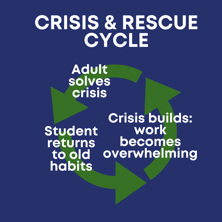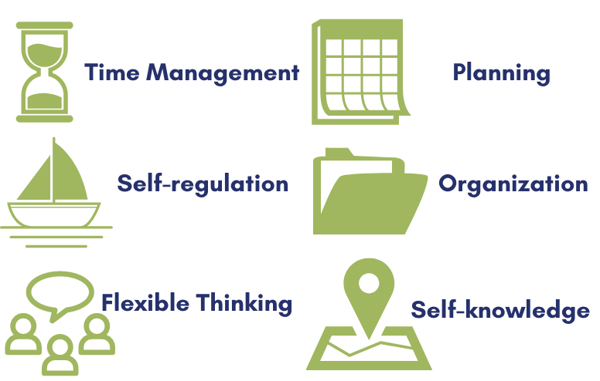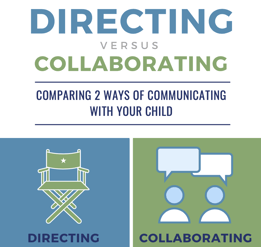It’s 7:45 on a Thursday night and your son finally gives his eyes a break from the TV just long enough to remember that he has a major essay due for English tomorrow. He might not admit it, but the frantic pacing and backpack digging already reveal everything you need to know - it’s not the first time he’s had a last-minute cramming crisis. Without asking details, you sigh and abandon your own plans to unwind and instead prepare yourself for another student-rescue mission. It seems like it was just yesterday when his last big semester-long project became a 2-day, all hands-on-deck ordeal to get it finished on time. He swore he learned his lesson, but here you are - stuck in this academic Groundhog-Day loop once again. Why on earth can’t he get himself organized and plan these things out? 
Over the years, we’ve seen this scenario play out time and time again. The specifics may change, but the broad strokes tend to stay the same: a student’s bad habits lead to an inevitable crisis - and the parents are tasked with saving the day. When this happens, you feel as if you’re forced into a corner. You deeply care about your child’s education, success, and well-being - all of which seem to be in jeopardy. How can you sit by and let this train wreck unfold?
In these situations, intervening can seem like the right decision. A bit of academic rescuing just comes with the parenting territory, after all, right?
However, it's a different matter entirely when intervening becomes the norm. When students start expecting that their parents or others will help manage a self-inflicted crisis, they don’t learn from the mistakes that led to the situation in the first place - they learn to be rescued (see the graphic, left). This outcome not only robs them of an opportunity to learn from their failures, but it also forces you into a micromanaging role within your child’s education that is unsustainable at best, and damaging at worst. This isn’t ideal for either of you, so what can you do instead?
When students start expecting that their parents or others will help manage a self-inflicted crisis, they don’t learn from the mistakes that led to the situation in the first place - they learn to be rescued (see the graphic, left). This outcome not only robs them of an opportunity to learn from their failures, but it also forces you into a micromanaging role within your child’s education that is unsustainable at best, and damaging at worst. This isn’t ideal for either of you, so what can you do instead?
In this week’s article, we’re going to share our top 3 tips for breaking the crisis and rescue cycle. These insights will give you the tools you need to redetermine the role you play in your child’s education, while also providing a road map to help prevent these crisis scenarios from happening in the first place.
Tip #1 - Identify the underlying problems
Of all the tips here, this one is the most important. These crises are typically a symptom of a more complicated issue relating to Executive Function (EF). The first key to breaking this crisis & rescue cycle is to identify which EF skills are contributing to these crises, as these are the ones your child needs to work on. These six are a few relevant ones to consider (full list here)

When looking at these skills, you’ll likely find some obvious contenders for “main problem.” For instance, if you notice that your child waits until the last minute to start an assignment, that’s a clear sign that their time-management skills may need some refining.
Once you’ve identified the obvious culprits, it’s time to open a dialogue with your child about what’s going on in their head when these stressful situations arise. Think about some leading questions you can ask around their approach to school work, such as:
- What's been preventing you from starting earlier?
- How do you feel when you have to cram?
- What's your first step when starting a big project?
- Do you think your work would be better if you had more time?
These types of questions have two big benefits. First, you’re already fostering one of your child’s critical Executive Function skills - self-awareness! By asking these sorts of questions, you’re providing them the opportunity to analyze their own behavior. This is a huge step in the right direction as teens with EF challenges may have never fully reflected on their habits. In taking a moment to reflect, your teen has the opportunity to come up with their own realizations about bad habits - a much more powerful learning experience than simply hearing it from someone else (or worse yet, their parents!)
Second, you'll have an extra opportunity to identify other EF skill-opportunities you may have missed at the surface level. For example, your student might reveal that they tend to push off starting when they feel overwhelmed about the project, which would point to emotional regulation or task initiation as additional EF skills to refine.
Tip #2 - Determine the level of support your child needs to address the issue
Now that you’ve identified a couple EF skills that are hindering their potential, it’s time to figure out the support they’ll need to address the issue. This will be specific to the severity and scope of their EF challenges, but in most cases, Executive Function Coaching is the gold standard. If you already know which EF skills need the most support, you can tailor your coaching search around those ones. And trust us - no matter who you choose, they’ll be impressed that you already have an awareness about the specifics of your child’s EF challenges.
However, if coaching is not an option, don't worry - there are plenty of great resources and books that can help guide your efforts to strengthen your child’s EF skills. Some of the ones we recommend include:
- Your Kid's Gonna Be Okay: Building the Executive Function Skills Your Child Needs in the Age of Attention - Michael Delman
- Smart But Scattered - Richard Guare and Peg Dawson
- The 7 Habits of Highly Effective Families - Stephen Covey
- The 7 Habits of Highly Effective Teens - Sean Covey
- Late, Lost, and Unprepared: A Parents’ Guide to Helping Children with Executive Functioning - Joyce Cooper-Kahn and Laurie Dietzel
Tip #3 - Decide how you’ll fit into their support (and commit to that lane!)
Now that you have some ideas for the kind of support your child needs, it’s essential to determine what role you’ll play going forward. If you’ve decided that coaching is the best option, the most important thing you can possibly do is fully commit to the process. For the students we work with, consistent, weekly sessions are the biggest determinants of success. Just like learning an instrument or any new skill, strengthening your Executive Function skills takes practice and commitment. Week-to-week sessions are essentially your student’s opportunity to practice. Without this consistency, students tend to fall into old habits once more - and as we know, that means an academic crisis is probably inevitable. Coaches can help in these situations, but this is not what coaching was designed for. If you’re looking for lasting behavioral change, consistency is everything.
If your child does start working with a coach, it’s time to start phasing yourself out of the day-to-day, academic minutia. This can be a real challenge for some parents, especially in the first few months before the change begins to take root. Yet, it's not your job to motivate your child. Although it’s difficult to step away, this doesn’t mean you have no role to play at all. Work with your child to determine how you can support this next chapter of their growth in a way that you’re both comfortable with. This could be something like checking in on weekly commitments they make, as opposed to scrutinizing every homework assignment. Sit back and see how they handle their newfound autonomy, and if something needs to change, work together for a solution. By shifting your role away from directing your child, you can settle into a more collaborative role that can provide support as needed while still fostering their independence.
If coaching is not the right option for you, and you prefer to try some strategies at home, this advice is still relevant. Find ways to collaborate with your teen to support their attempts at using these new tools and strategies. Set boundaries, work together, and be sure to celebrate progress when you see it - because those moments matter more than you may realize!
Photo by Noah Buscher on Unsplash
Download our infographic to learn how to communicate more collaboratively with your child, while also building their self awareness skills.


